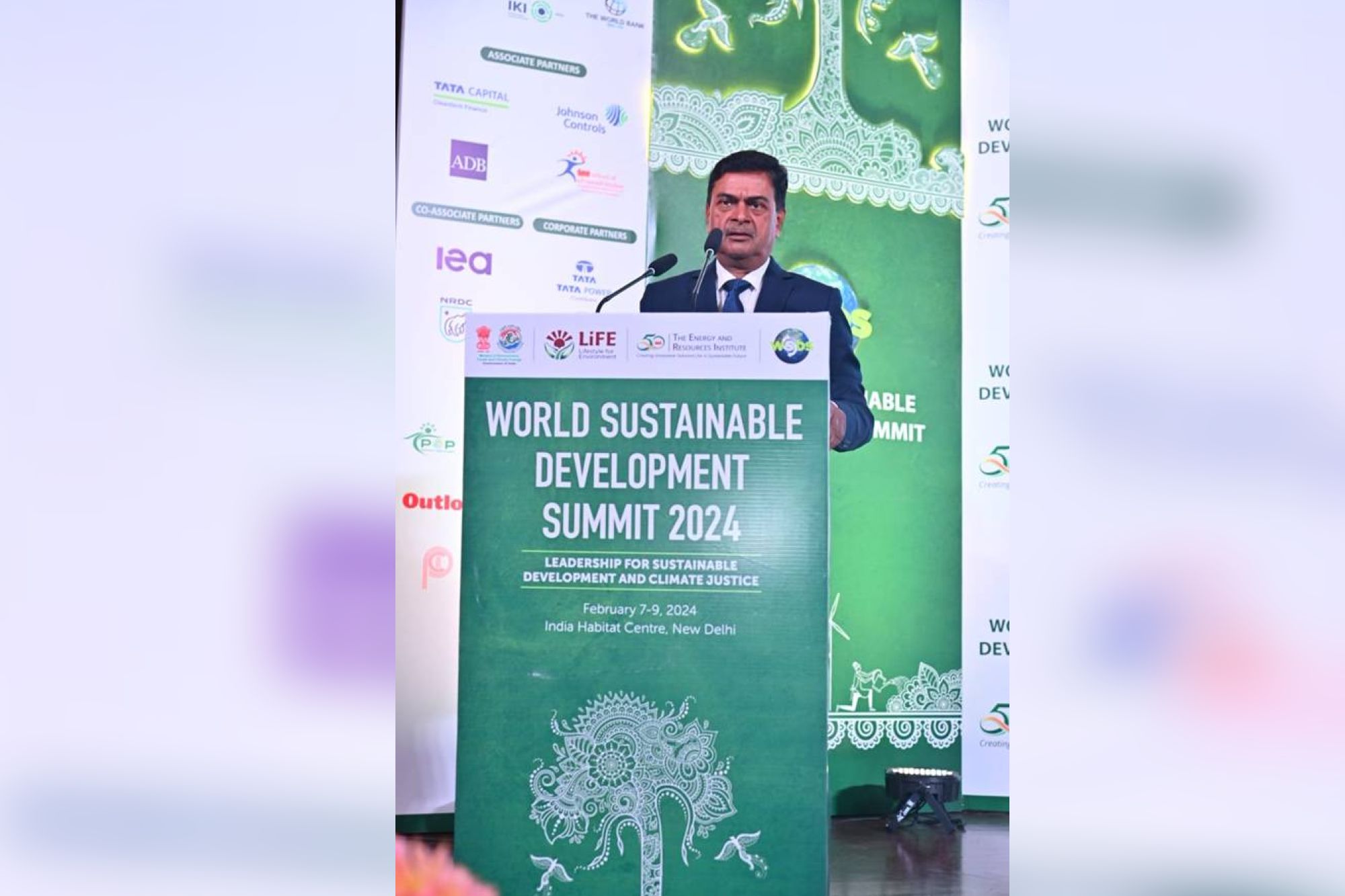Government, TERI collaborate to form Centre for Energy Transition
By EPR Magazine Editorial February 13, 2024 12:21 pm IST
By EPR Magazine Editorial February 13, 2024 12:21 pm IST

The initiative aims to pioneer sustainable energy pathways and foster innovation for global transition.
The Union Minister for Power and New & Renewable Energy RK Singh has announced the setting up of a Centre for Energy Transition, as a collaborative initiative between the Government of India and The Energy and Resources Institute (TERI). The Minister made this announcement at the 23rd edition of the World Sustainable Development Summit (WSDS) being organised by TERI, in New Delhi on February 9, 2024. He said that the institute would be expected to play a pivotal role in identifying pathways for sustainable energy transition and fostering innovation in the renewable energy sector.
Addressing the summit delegates during a session on “Energy Transitions for People, Peace, Prosperity and our Planet”, the Union Minister emphasised India’s leadership in climate action and energy transition. He highlighted India’s remarkable progress and said: “44 percent of our power generation capacity is from non-fossil-fuel sources. About 180-plus GW of total capacity of 427 GW is from non-fossil-fuel sources, most of which is renewable capacity. Our rate of energy transition is unmatched. We are the only country issuing bids for round-the-clock renewable energy.”
Singh said that India is the only major economy which has achieved both NDCs way ahead of schedule. “When neutral observers graded us, they rated India as the only major country whose energy transition actions are consonant with sub-2-degrees raise in global temperature,” added the Minister.
The Power Minister underlined the need for a change in public discourse. “The developed countries developed using fossil fuels; 77 percent of legacy carbon emissions are caused by developed countries. This is something which never comes out in the public discourse. India comprises 17 percent of the global population, while we have been responsible for only 3 percent of cumulative global carbon emissions. If the developed countries continue at this rate of the pace of emissions, the carbon space will soon get extinguished, while we developing countries need carbon space to grow.”
Singh said that the developed countries must realise that no country is going to compromise on their development trajectory. “They need to vacate carbon space so that developing countries can develop.”
He further said that the per capita emissions of developed economies are about 4 times the global average. “The discourse is hypocritical, since nobody talks about per capita emissions, which are the nub of the problem. The argument to do away with coal is a red herring, since it is not just coal, but gas too which emits carbon dioxide and also methane. None of the COP gatherings has addressed this.”The Minister said that developed countries did not add energy storage capacity, due to which prices are high. “Sustainable development has to rest on two planks: one, those emitting at rapid rate need to bring down emissions; two, those who need to develop need to be assisted with technology and finance, thus bringing down price of energy transition.” He said that while India does not need financial assistance, other developing countries need access to finance and technology in order to grow.
The Minister emphasised Prime Minister’s emphasis on Mission LiFE, stating, “The development model of the world must evolve; increasing demand without sustainability spells doom.” Highlighting India’s strides, he added, “We are boosting green vehicles and ramping up green hydrogen production.” However, he cautioned, “Protectionist trade barriers obstruct progress. It’s time for a collective rethink.”
Chairperson of TERI Governing Council, Nitin Desai, speaking on India’s commitment to sustainability, announced the establishment of this Centre in Hyderabad, in partnership with the government. This centre aims to develop comprehensive energy transition pathways, not only for India but also for other nations.
Director-General, TERI, Vibha Dhawan concluded by reiterating TERI’s commitment to sustainability and its dedication to driving meaningful change. She emphasised the importance of collaboration and innovation in tackling the pressing challenges of climate change and building a more sustainable future for generations to come.
The World Sustainable Development Summit 2024 provided an invaluable platform for robust discussions and collaborations towards achieving sustainable development goals. As India continues to lead by example in energy transition and sustainability, initiatives such as the establishment of the Centre for Energy Transition mark significant milestones in the nation’s journey towards a greener future.
We use cookies to personalize your experience. By continuing to visit this website you agree to our Terms & Conditions, Privacy Policy and Cookie Policy.